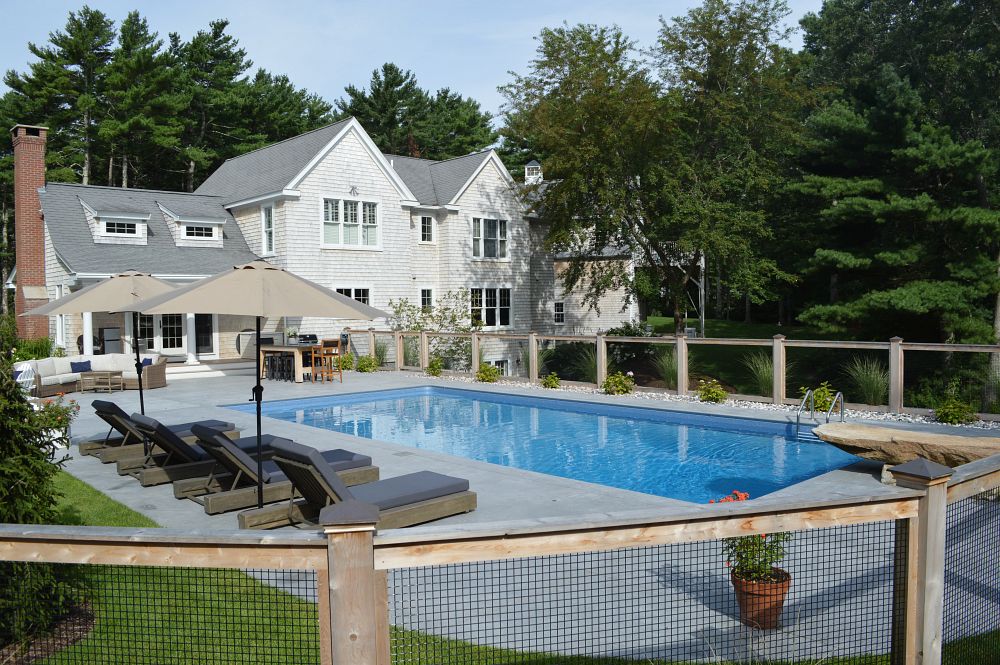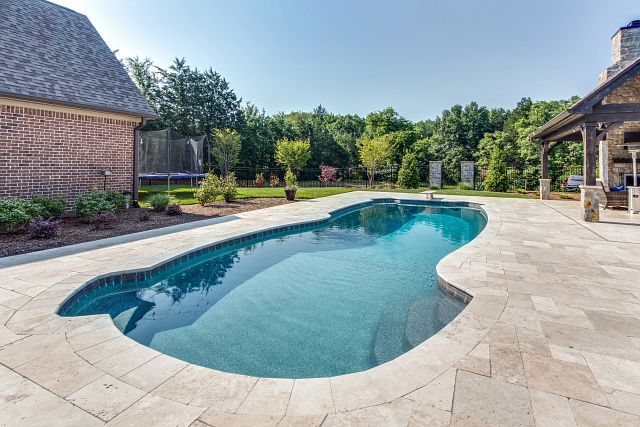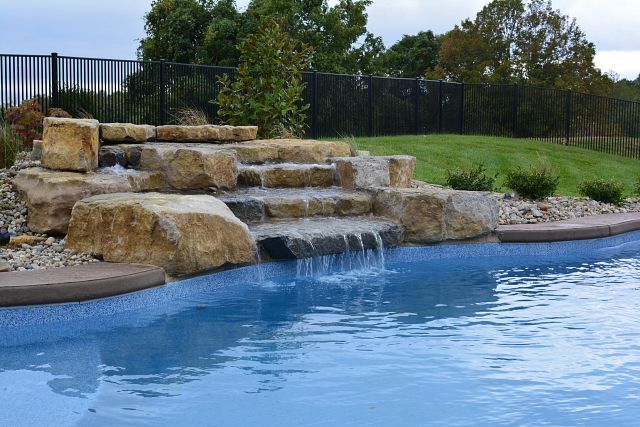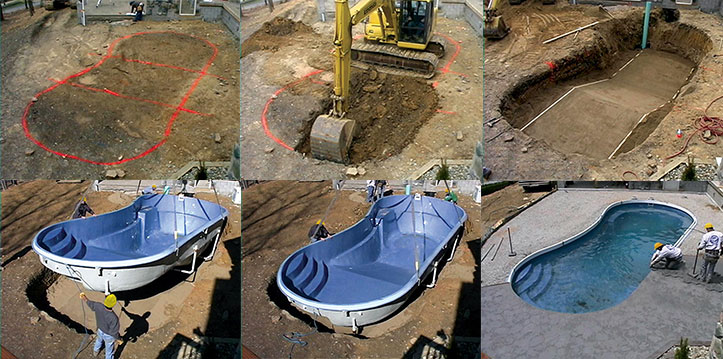Kansas is marked by hot summers, moderate humidity and mild winters. Whether you live in a bustling metro area like Kansas City or Wichita, or one of Kansas’s smaller suburban or rural enclaves like Overland Park, Fort Scott or Abilene, one of the best ways to beat the heat in The Sunflower State is to consider making a brand new pool a part of your backyard.
If you’re thinking about dipping a toe in the waters of pool ownership, remember that your pool itself is just one part of the bigger picture. Think about how it will work with any decking and landscaping, as well as the various ways you may want to use your backyard. If you dream of entertaining guests and serving up slabs of juicy Kansas City BBQ, think about how your poolside area can incorporate a grilling station. (And please wipe your fingers before entering the pool!) If gardening speaks to your soul, consider how flowers and plant life will look surrounding your beautiful new pool. Beyond aesthetics, consider some of the more practical features that can help you enjoy your pool – and potentially save you time and money – such as an autocover.
If you’re thinking of making a sparkling new pool your own, we’ll walk you through the benefits of both fiberglass and vinyl liner pools, maintenance tips and Kansas state laws surrounding pool ownership. Let’s dive in!
Fiberglass Pools in Kansas
Fiberglass pools are known for their longevity, ease of maintenance, and sheer beauty. Their smooth, crystalline surface makes fiberglass pools easy on your feet when wading in. They also pave a faster path to installation, especially if you’re eager to get your new pool up and running quickly in time for summer. Because fiberglass pool shells are prefabricated, then transported into a freshly-excavated spot in your backyard, they can be installed faster, giving you more time to enjoy your new pool.
Learn more about the benefits of owning a fiberglass pool.
How Much Does an Inground Pool Cost in Kansas?
The cost to install an inground pool in Kansas can vary depending on several factors, including your pool’s size and materials. However, these are just part of the total cost for your pool. You’ll also want to consider the cost of legally required fencing around your pool to add an element of safety, as well as any add-on features like a tanning ledge or spillover spa. Practical features, such as an automatic pool cover, can add to the up-front cost of your pool package, but can pay for itself over time in terms of saving you on energy costs and maintenance.
Although buying a pool can be an expensive proposition, Kansas’s lower cost of living can make owning a pool an even more alluring and realistic prospect. Overall, The Sunflower State has a cost of living that’s 12% lower than the rest of the country, with housing coming in at a whopping 30% lower than other states throughout the US. Coupled with an 8% lower cost of goods and services, it can make for a more attainable path to pool ownership.
And if you don’t have the savings to purchase a pool today, it’s possible to explore a range of financing options to help you start enjoying your new pool today and pay it off tomorrow!
Fiberglass Pool Designs for Kansas Homes
Kansas has a reputation as flat prairie land. Graced with relatively mild weather and a mix of urban and rural areas, Kansas residents are spoiled for choice when it comes to their options for a brand new pool. The key to getting the most enjoyment from your pool is to narrow the field to options that will best complement your backyard and lifestyle.
Fiberglass pools come in a variety of shapes, colors and sizes. Whether you crave the crisp elegance of a rectangular fiberglass pool or the back-to-nature curves of a freeform pool, there’s a pool for every home that can give you decades of enjoyment. It’s all about looking at the big picture!
When planning your pool, think about how you plan to use it – and who will use it:
- Do you have young children or teens?
- Will they bring friends over to use the pool?
- Will seniors or individuals with compromised mobility use your pool?
- What safety features might you need so that everyone can safely enjoy your pool?
- Do you want your pool to be the focal point of your backyard? Or do you want it to be part of a more multi-purpose backyard, sharing space with an outdoor kitchen, pretty pergola or blossoming veggie garden?
- Do you enjoy entertaining? If so, how many people typically attend your backyard get-togethers?
- Do you plan to use your pool for exercise, relaxation or both?
Working with a knowledgeable licensed builder can help you better understand what will work best for your yard and any naturally occurring property constraints.
Pool safety should also be top-of-mind when choosing your pool. Be sure to save room for features to make your pool compliant with state and local laws. For instance, Kansas requires all residential pools to be surrounded by a fence that meets state and local regulations
An autocover is another feature that can add both an element of safety, as well as reduce the amount of time you spend maintaining your pool. An autocover can help to reduce water evaporation, save on energy costs, and act as a protective barrier against pets or children accidentally falling into your pool when not in use. It can also help keep leaves and pollen out of your pool, reducing the risk of pool algae and pollen clogging your filters.
At Latham, we’re big believers that there is a pool for every home, regardless of size or space. When working with a licensed professional pool builder, it’s important to keep an open mind. Although you may have a distinct vision for your pool, they may help you realize that a different pool shape or size may work better with your backyard and give you much more enjoyment.
Throughout this guide, you’ll see a sampling of some of the pools we’ve helped build throughout Kansas. Don’t see something that resembles the pool of your dreams? Contact a local independent builder to see even more photos and videos of pools in their portfolio that may not be available online just yet. You’re sure to find a springboard for your imagination and beyond!
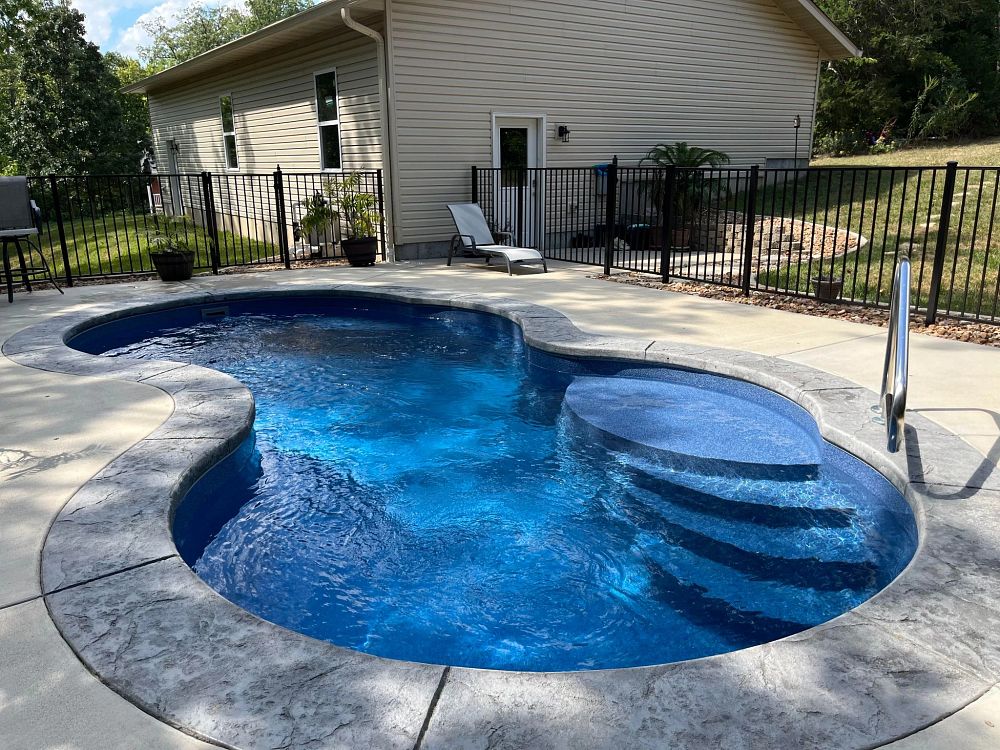
Small Pool Designs for Metropolitan Kansas Areas
If you live in a bigger or more densely populated city in Kansas like Kansas City, Topeka, or Overland Park, you may have a smaller backyard. For those times when you want to escape to an island getaway but find yourself landlocked in the Heartland, a pool can provide you and your family with a backyard getaway. Even a small pool can give you a place to cool off and enjoy some well-deserved downtime.
For a classic and classy addition, consider the simple, rectangular elegance of the Tuscan. Its compact 11’ x 20’ size offers plenty of space for hosting pool parties or swimming laps. For families with young children who want a small, rectangular pool that’s big on fun and loaded with features, the 9’ x 17’ Enchantment offers an ultra-wide tanning ledge that can double as a wading area for kids. The Enchantment’s easy-access steps are an added bonus!
For those with limited space that want a splashy new pool with visual impact, the 10’ x 20’ kidney-shaped Jamaica is a fantastic option. Packed with features like swim-up seating and beverage benches, you’ll be transported to the tropics without ever having to leave home.
Larger Pools for Suburban and Rural Kansas
Kansas is home to many rural and suburban communities, like Abilene – loaded with small-town charm – and the low-key tourist attraction of Galena, KS – the inspiration for Radiator Springs from the animated film Cars. With small-town living comes big backyards with ample space to fit a pool.
The size and type of pool you’re looking for, however, may depend on how you plan to use your backyard. If you dream of making your backyard the place to host friends and family, watching the big game poolside, then a larger pool may fit the bill. If you plan on nestling your pool alongside other features – like a swing set for the kids, a relaxing patio or a thriving vegetable garden – you may want a more mid-sized option.
For a sleek and striking medium-sized pool, the rectangular Olympia has slip-resistant corner steps and swim-up seating packed into its 14’ x 30’ frame.
Want something bigger? The freeform Caribbean clocks in 16’ x 40’ and gives the feel of a gentle river cutting through your backyard. Equipped with scalloped corner steps and swim-up seating, this eye-catching pool is ideal for entertaining.
If you’re planning on using your pool in cooler weather or love the idea of a nighttime soak under the stars, fiberglass models with built-in spillover spas are another option to consider.
Fiberglass models with built-in spillover spas can be another option for Kansas residents with lots of space to go big with their pool dreams. The midsize Laguna Deluxe and the larger Cancun Deluxe are just two options with soothing, built-in spas that can help you maximize enjoyment through the seasons.
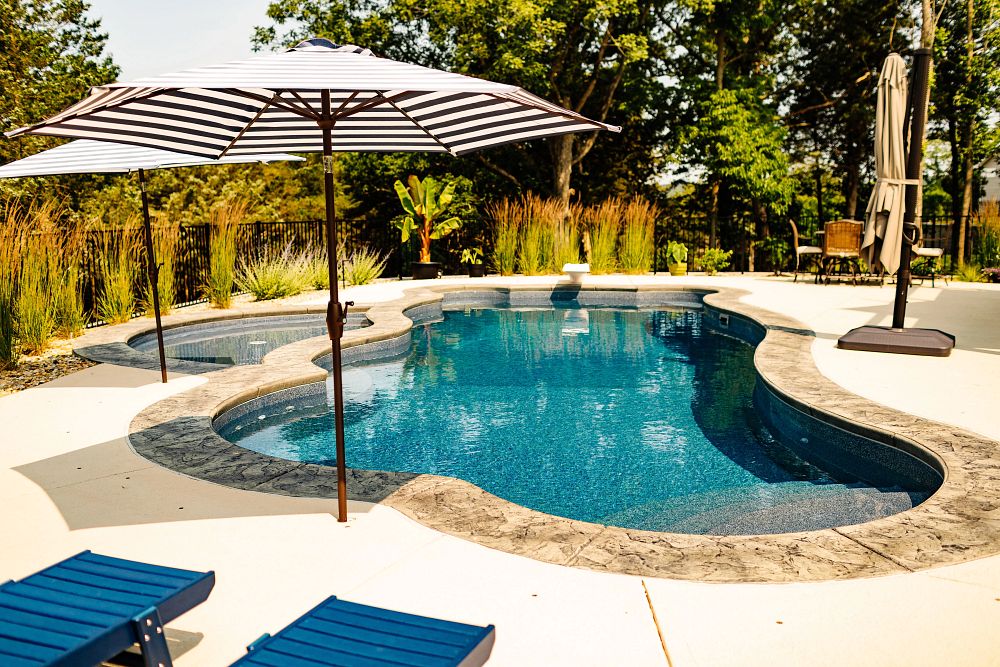
Inground Vinyl Liner Pools in Kansas
With a reputation for being affordable, durable, and easy-to-care-for, inground vinyl liner pools offer a variety of benefits to Kansas residents shopping for a new pool designed to delight them for years to come.
Vinyl Liner Designs for Kansas Pools
For budget-conscious Kansas residents in the market for a new pool, vinyl liner pools are an excellent option! They come in many of the same shapes and sizes as their fiberglass cousins and also offer limitless potential for customization. From customizing simple things like liner colors and patterns to adding more elaborate features that pump up the excitement – like bubble jets and water features, tanning ledges or colorful LED pool lights – your vinyl liner pool can be created to your exact specifications.
One of the best things about a vinyl liner pool is that it’s relatively easy in terms of upkeep. Although they require a little more muscle to maintain compared to their fiberglass cousins, the extra effort is worth it in terms of cost savings. Not only are they less expensive and less labor-intensive than concrete or gunite pools, but they also yield greater cost savings over time. Concrete pools are porous, making them more prone to developing algae, which can throw off your water chemistry. Additionally, concrete pools require resurfacing every 10 years – a costly endeavor! By contrast, a well-maintained vinyl liner only needs to be swapped out every 10 years, giving your pool a less expensive “facelift.”
Check out some of the fabulous vinyl liner pools Latham has had a hand in building throughout The Sunflower State. Don’t see one in this article that speaks to you? These are just a launchpad for your imagination, as fiberglass pools can be customized in almost endless ways. Get in touch with a local builder and they can show you more images and videos in their portfolio that may not be available online just yet.
With a reputation for being affordable, durable, and easy-to-care-for, inground vinyl liner pools offer a variety of benefits to Kansas residents shopping for a new pool designed to delight them for years to come.
Vinyl Liner Designs for Kansas Pools
For budget-conscious Kansas residents in the market for a new pool, vinyl liner pools are an excellent option! They come in many of the same shapes and sizes as their fiberglass cousins and also offer limitless potential for customization. From customizing simple things like liner colors and patterns to adding more elaborate features that pump up the excitement – like bubble jets and water features, tanning ledges or colorful LED pool lights – your vinyl liner pool can be created to your exact specifications.
One of the best things about a vinyl liner pool is that it’s relatively easy in terms of upkeep. Although they require a little more muscle to maintain compared to their fiberglass cousins, the extra effort is worth it in terms of cost savings. Not only are they less expensive and less labor-intensive than concrete or gunite pools, but they also yield greater cost savings over time. Concrete pools are porous, making them more prone to developing algae, which can throw off your water chemistry. Additionally, concrete pools require resurfacing every 10 years – a costly endeavor! By contrast, a well-maintained vinyl liner only needs to be swapped out every 10 years, giving your pool a less expensive “facelift.”
Check out some of the fabulous vinyl liner pools Latham has had a hand in building throughout The Sunflower State. Don’t see one in this article that speaks to you? These are just a launchpad for your imagination, as fiberglass pools can be customized in almost endless ways. Get in touch with a local builder and they can show you more images and videos in their portfolio that may not be available online just yet.
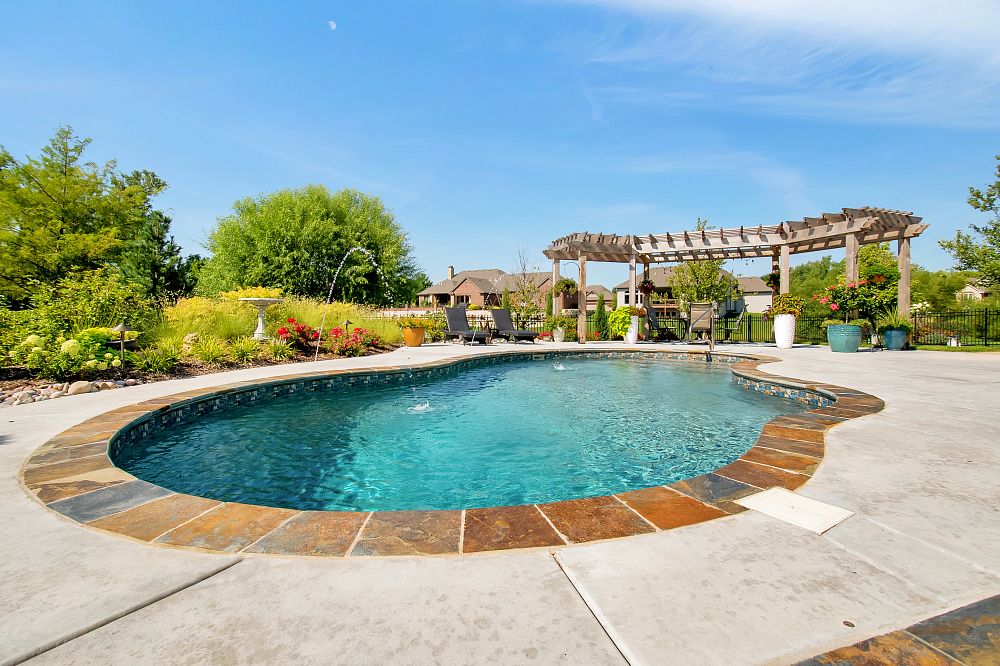
Transforming or Replacing Your Current Pool in Kansas
If you have an existing concrete or gunite pool, a vinyl liner pool can be an ideal option if you’re looking to replace or renovate an older pool. Even a well-kept concrete pool can be expensive to maintain, as they require resurfacing every decade. With age, concrete pools can become rough and chalky, making them look grungy and more prone to algae clinging to its surface. By contrast, folks with a well-maintained vinyl liner pool may only need to change their liner once every 10 years, saving you money over the long haul.
A vinyl liner pool can also offer you a lot more options for custom add-ons to help you get even more enjoyment from your pool. From spacious tanning ledges to exciting fire bowls and soothing water features, a vinyl liner pool can be re-imagined to fit your lifestyle and aesthetic through the years.
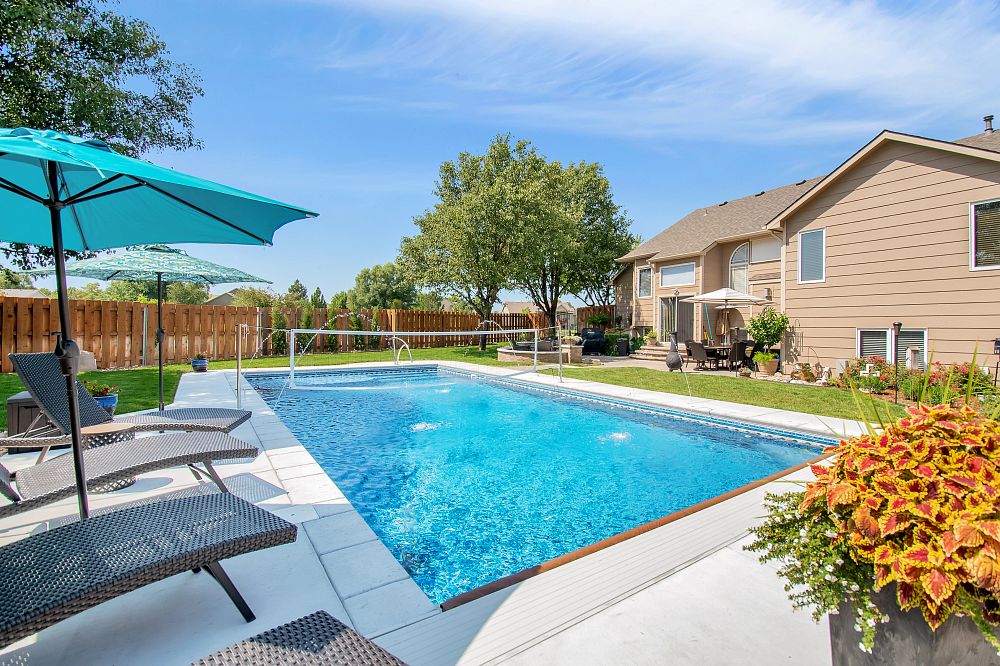
Considerations for Replacing Vinyl Liners or Reshaping Your Pool
One of the best things about a vinyl liner pool is that it allows greater flexibility to reshape it in a way that works for your ever-changing lifestyle.
Families with young children today may want a pool outfitted with a variety of features to give the kids their very own stay-at-home water park, decked out with water slides, fountains and dazzling LED lights. Features like multiple entry points can be great for young swimmers who get tuckered out easily, while slip-resistant ultra-wide tanning ledges can provide a wading area for kids to play while under the watchful eye of their parents.
When the kids are grown, you may want less pool to take care of and to remove yesterday’s slides to reshape your pool into a space for grown-ups. For empty nesters or retirees, those same multiple entry points and slip-resistant steps can remain, but you can reimagine your pool with more swim-up seating to welcome guests and swap a water slide for a diving board.
Because reshaping, adding or subtracting features from your pool is an invasive process, you may want to plan ahead to make those upgrades alongside a routine replacement of an older vinyl liner. This can help you save time and money throughout the process!
Installing an Inground Pool in Kansas
Whether you’re bedazzled by the crystalline surface of a fiberglass pool or the customization possibilities of a vinyl liner pool tickles your fancy, it can be helpful to learn about the installation process for your pool of choice to prep you for the road ahead.
Installing a Fiberglass Pool
Installing your new fiberglass pool starts with your builder team digging a space for it in your backyard. Then, a prefabricated pool shell is transported from the factory to your home, ready to be installed and enjoyed.
Learn more about how fiberglass pools are installed.
Installing a Vinyl Pool
Your building team will kick things off by measuring your yard and excavating a spot where your new vinyl liner pool will live in your backyard. They finish the job by sealing your liner-of-choice in place as the crowning touch on your custom vinyl liner pool.
Learn more about the vinyl liner pool installation process.
How to Prepare Your Pool for Tornado Season in Kansas
Kansas is situated in America’s Heartland, but is also positioned in the middle of Tornado Alley. Contending with a Kansas twister is a lot less whimsical than a trip with Dorothy and her friends down the Yellow Brick Road. For pool owners in Kansas, preparedness for tornadoes is the name of the game to help protect your pool and mitigate damages.
Tornado season in Kansas hits its fever pitch between May and June. On average, Kansas sees roughly 96 tornadoes tear through the state per year, with approximately 38 touching down in the month of May alone.
When preparing your pool in advance of a tornado, the first and most important thing is to turn off all power to pool equipment, including your pump and filtration systems and heaters. If you have pool lights, be sure to turn off their power source, as well. While turning off your power may not prevent damage to the equipment itself during high winds, it can help prevent dangerous electrical issues.
If possible, move outside pool equipment indoors, preferably to a basement or lower level of your home. If they must remain outside, secure them with a waterproof covering.
When preparing your pool for a tornado, do not drain your pool water. Although your first instinct may be that draining your pool can prevent debris and dirt from tampering with your water chemistry, draining your pool can actually cause bigger problems. In reality, draining your pool leaves it more vulnerable to scratches and scrapes due to any debris or falling branches that may land in your pool during a storm.
Also, do not store pool or patio furniture in your pool during a tornado. Instead, store any portable furniture indoors or in a safe outdoor enclosure.
After the storm has passed, be prepared to clean up any debris in or around your pool. You will also need to rebalance your water chemistry or possibly shock your pool.
Automatic Pool Covers
If there’s one add-on you may want to account for in your pool budget, an automatic pool cover can be a smart investment that can help you save time and money in the long run, as well as provide you with an additional safety barrier to help prevent accidents.
An autocover can help you save between 50% to 70% on energy costs each year, as well as help reduce water evaporation and the need to rebalance your water chemistry. In areas of Kansas that experience drought or water shortages, this can help you not only embrace greener ideals and contribute to water conservation, but also ensure that you can use your pool during these periods.
Autocovers can also help give you back more time to enjoy your pool, reducing the frequency of skimming out seasonal pollen and leaves. Pollen can clog your pool’s filtration system, as well as contribute to algae growth. An autocover can help keep pesky pollen from finding its way into your pool when not in use.
Most importantly, autocovers can save lives, preventing kids and pets from accidentally falling in when your pool is unattended. An automatic pool cover can also help serve as a deterrent from people using your pool without permission.
Fiberglass & Vinyl Liner Pool Care & Maintenance in Kansas
Whether you choose a fiberglass or vinyl liner pool, both are beloved for their low-maintenance vibe. However, your maintenance schedule and checklist may differ slightly, depending upon which type of pool you have.
Fiberglass Pool Maintenance
Not only are fiberglass pools easy on the eyes, they’re easy in terms of maintenance. To keep your fiberglass pool looking and performing its best, set aside time each week to test your pool’s water chemistry, skim and empty filter baskets. Each month, check your filter and back flush your filtration system.
Get more tips for maintaining your fiberglass pool.
Vinyl Liner Pool Maintenance
Maintaining a vinyl liner pool requires just a little more elbow grease than a fiberglass pool. However, their overall cost savings make the extra effort worth it!
Plan to test your water’s chemical and pH levels each week and regularly skim your pool. To keep your liner looking fresh – and to prevent stains, algae and calcium build-up – give your liner a gentle scrub each week, using a soft-bristled brush.
Each month, conduct a routine inspection of your liner to check for leaks. If you spot a small tear, patch it up ASAP. This can help prolong the life of your liner and avoid having to replace it ahead of schedule. A well-maintained liner can last for up to 10 years!
Another thing you can do to give your vinyl liner a longer lease on life is to use only soft toys in and around your pool. Foam pool noodles, inflatable rafts and soft pool toys can pump up the fun factor without the risk of damaging your liner.
For more tips, download our vinyl liner maintenance checklist.
Kansas Regulations for Installing an Inground Pool
Along with the fun of owning a pool comes a fair amount of responsibility. Kansas has several local and statewide laws that you should familiarize yourself with before taking the plunge into pool ownership.
Because state and local laws can change over time, it’s important to do your homework before breaking ground on a beautiful new pool. Kansas has several residential pool laws that blanket the state, however, your city, township or municipality may have more restrictive regulations than those of the state.
Be sure to check with your local building office first to ensure your pool is compliant with any codes. Additionally, working with a licensed professional builder can also help you better navigate any state and local regulations and ensure your pool is up-to-code.
To help you gain a better understanding of laws that may impact you as a future pool owner, here are some of the most common questions we hear around regulations for owning a pool in Kansas.
Do you have to have a fence around a pool in Kansas?
Kansas requires that all residential pools must be enclosed by a fence or barrier at least 5 feet high. requires that all residential pools must be enclosed by a fence or barrier. This law applies to inground and above-ground pools, as well as hot tubs and spas. Spas and hot tubs in the state of Kansas are subject to additional regulation, in that they must be “covered with an insulated cover, which shall be secured by locks when the spa or hot tub is not in use.”
Mission, KS, however, has even stricter requirements for pool fencing, requiring that all private swimming pools be surrounded by a fence or barrier no less than 6 feet high.
Because laws can change periodically, be sure to check with your local building office to confirm if your city or township may have more prohibitive requirements to ensure your pool – and fencing – is compliant with all laws.
Do I need a permit to install a pool in Kansas?
While the state of Kansas itself does not have a blanket requirement for permits to construct a swimming pool, many cities and counties throughout The Sunflower State do require a permit before building a new pool.
In most cases, the definition of a swimming pool applies to any structure that can hold water more than 24 inches deep. This definition also applies to hot tubs, spas, and jacuzzis.
Depending on where you live in the state, different cities and counties in Kansas have different permitting requirements. For instance, Overland Park, KS requires a building permit for all new residential swimming pools that must be submitted along with a complete plot plan that illustrates planned fencing, location and distance from property lines, and more.
Similarly, Lawrence, KS also requires a building permit to construct a new pool, which must also be accompanied by a letter of review and approval from the Douglas County Health Department and a detailed plot plan.
Be sure to check with your local building office to confirm what permits you must have in order to begin construction on your new pool in Kansas. Working with a licensed professional builder can help you better understand these laws and obtain the correct permits.
How close to the house can a pool be in Kansas?
The distance between your swimming pool and home varies depending on where you live in Kansas. Different cities and counties have their own requirements.
For instance, Lawrence, KS requires that all pools and spas “must be located in the rear yard and a minimum of 5 feet from all property lines.”
In Miami County, Kansas, the size of your backyard and parcel of land itself play a role in how close your pool can be to your home – and neighboring property lines. For instance, if your land is less than 100 feet wide, you can only add a pool within 20 feet of a setback or adjoining property line. If your pool is any closer, the county will need to dispatch a registered surveyor and may “require a professionally prepared site plan and construction staking of a proposed building site.”
The city of Mission, KS also has strict rules around placement of swimming pools, noting that they cannot be less than 7 feet from a side or rear property line and no less than 15 feet from any property line on the side street of corner lots. Mission, KS mandates also require that pools should not be less than 20 feet from the main building on an adjoining lot, “nor closer than 60 feet to the front property line.
Because your city or county requirements may vary and laws change over time, be sure to check with your local building office to confirm the proper, legal distance of your pool from your home, as well as any adjoining property lines. A licensed professional builder can help you better understand these laws and make sure your pool meets all state and local building codes.
Are pool covers required in Kansas? If so, what kind?
Although pool covers are not required in Kansas, the state does require that any hot tub or spa must be covered with “an insulated cover secured by straps or locks.” If you opt for a pool with a spillover spa in Kansas, you are required by law to ensure that it has a cover that meets statewide standards.
In some parts of Kansas, including Eastborough, KS, residents have the option to choose an automatic safety cover in lieu of approved fencing (at least 5 feet high). This power safety cover must meet regulatory requirements.
Pool covers can be an important safety measure that can save lives. Be sure to check with your local building office to confirm any local regulations around safety covers to be sure your pool and/or spa are compliant.
Kansas Pool Seasonality
Kansas has relatively mild weather year-round, with hot summers and comfortable spring and fall temperatures. Between December and March, temperatures range between highs in the 40 to 50 degrees Fahrenheit range, and lows in the 20 to 30 degrees Fahrenheit range.
Typically, many Kansas residents choose to open their pools in May, when temperatures are well into the 70s. Historically, May is also Kansas’s peak month for tornadoes and Sunflower State residents may choose to keep their pools closed until after the worst of tornado season has passed.
However, for those brave enough to open their pools early – or those who have a heated pool, Kansas residents can start enjoying their pools as early as April. As an added bonus, pool parents with heated pools can potentially use their pool in October before closing their pool before winter sets in. For those without heated pools, September or early October is prime time for closing your pool.
Typically, it’s a best practice to close your pool when water temperatures go below 65 degrees. This can help prevent algae from blooming beneath your winter cover, making reopening your pool – and balancing your water chemistry – much more difficult than it has to be the following spring! to avoid algae developing under cover, leaving you with a nasty and time-consuming surprise when you reopen the following spring.
Speaking of closing your pool for winter, Kansas has mild winters with snowfall averages at 19 inches annually throughout the state. If you live in a region that has heavy snowfall and may have an automatic pool cover, it can be a good idea to invest in a winter pool cover. These covers are specially designed to support the weight of heavy snow so that it doesn’t rest on top of an autocover, running the risk of damaging its delicate mechanisms.
To help you enjoy your pool throughout the seasons, here are a few more tips for Kansas pool owners:
- Spring: Spring is prime tornado season in Kansas, with May, historically seeing the most activity. Kansas pool owners should stay on top of impending weather events and take care to protect their home and pool by following best practices – chief of which is shutting down all power to your pool equipment. Beyond taking proactive steps to protect your pool during tornado season, Kansas residents should also tend to the more commonplace aspects of pool maintenance, such as regularly skimming spring pollen from their water’s surface. If left unattended, tiny pollen grains can clog your pool filter and play a role in algae development.
- Fall: If you have a heated pool, you may be able to squeak out several more weeks of pool season before closing in October. If you plan to keep your pool open during fall, stay on top of weekly pool cleanings to fish out any autumn leaves. If left to accumulate, leaves can rot and contribute to algae growth, throwing off your water chemistry. An autocover can help you keep leaves out when your pool is not in use, alongside a host of other benefits!
- Winter: When it’s time to close your pool for winter, take special care to remove all air from water lines. Many Kansas residents opt to close their pools themselves, but you can also enlist the aid of a professional to help you winterize your pool, making for a smooth opening the following spring!
Kansas Pool FAQs
What type of inground pool is best for Kansas?
If you’re planning on a new pool in Kansas, you can’t go wrong with either a fiberglass or vinyl liner pool. Both fiberglass and vinyl liner pools can be great choices for busy families or beginner pool owners alike. It all comes down to what type of pool will fit best with your lifestyle.
Fiberglass pools have an advantage due to their smooth surface and ease of maintenance. If you’re eager to get your new pool up and fully operational, fiberglass pools can often be installed faster. Fiberglass pool shells are prefabricated, then transported to your yard for installation, paving a faster path to start enjoying your pool and making memories!
Vinyl liner pools are another excellent option for folks who like the flexibility of being able to change the look of their pool over time, adding and subtracting features to better suit you and your family through the years.
If you’re still deciding which option is right for you, chat with a local builder to gain a better understanding of what type of pool may work best for your needs and be a cherished part of your backyard for years to come.
Is it worth it to install a pool in Kansas?
A well-maintained pool has the potential to increase your home’s resale value between 5% and 8%. Not only can it enhance your home’s curb appeal, but can also entice prospective buyers who may have aspired to owning a pool and now have a ready-made backyard oasis once they move in!
Even if you’re not planning on selling your home in the near – or distant – future, the true value of a pool is in the enjoyment it gives you and your loved ones.
Do I need to winterize my pool in Kansas?
Even though Kansas has relatively mild winters, residents should plan to winterize their pools before freezing temperatures set in. This can help prevent water lines from cracking during cold snaps, making it more difficult to reopen your pool in springtime.
From outfitting your pool with a seasonal safety cover to removing air from your water lines, get more helpful tips from Latham on how to winterize your pool.
How long will a fiberglass pool last in Kansas?
A well-maintained fiberglass pool can last between 25 to 30 years – or even longer. Given Kansas’s typically mild weather, your pool can last for decades. However, Kansas’s positioning in Tornado Alley can pose the risk of damage to even the best-kept fiberglass pools. When shopping for a pool, chat with a local builder who may be able to offer you even more helpful tips on protecting your investment in the event of a tornado so you can enjoy your pool for many years to come.
Find Latham Builders in Your Area of Kansas
If you live in Kansas and are thinking about taking the plunge into pool ownership, Latham can help make your pool dreams a reality. We’ve helped many happy customers throughout Kansas, including those in:
- De Soto, KS
- Gardner, KS
- Kansas City, KS
- Meriden, KS
- Olathe, KS
- Oskaloosa, KS
- Topeka, KS
- Valley Falls, KS
Build the Pool of Your Dreams for Your Kansas Home with Latham
A new pool can give you a place to relax, exercise or enjoy many happy hours with loved ones through the years. Get in touch with a licensed professional builder to start making memories in your brand new pool today.
Contact us to learn more.

